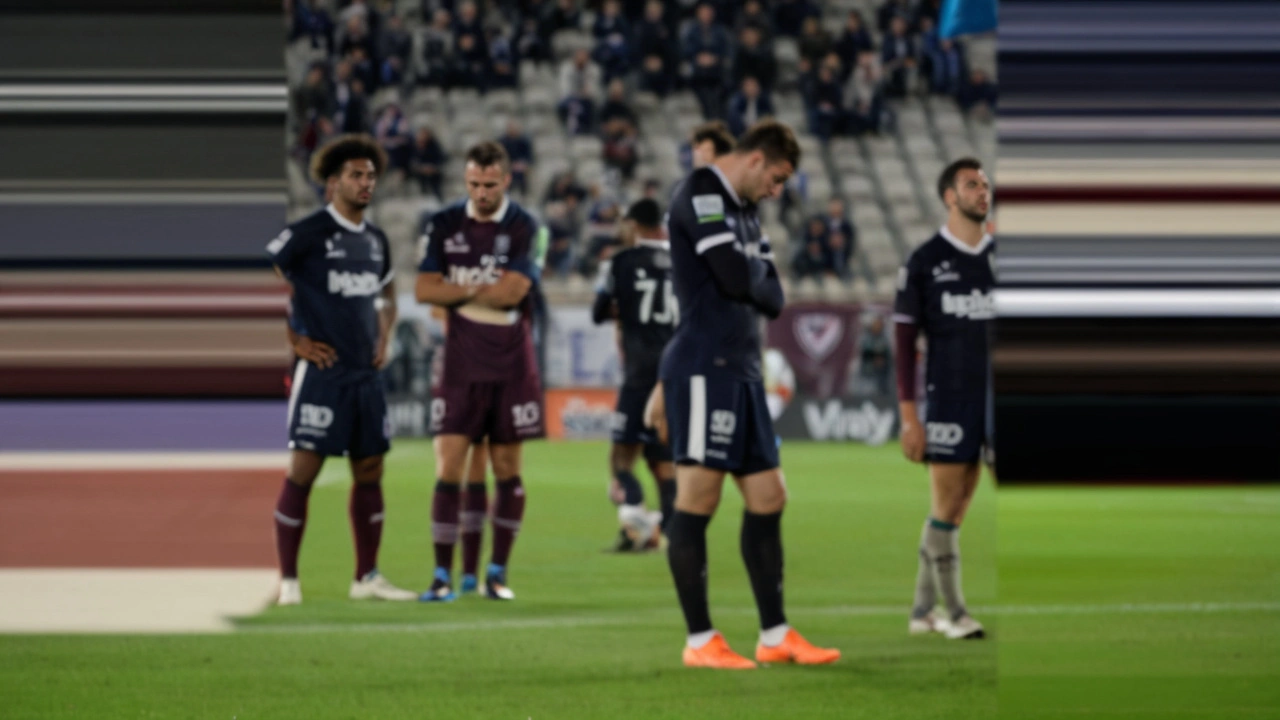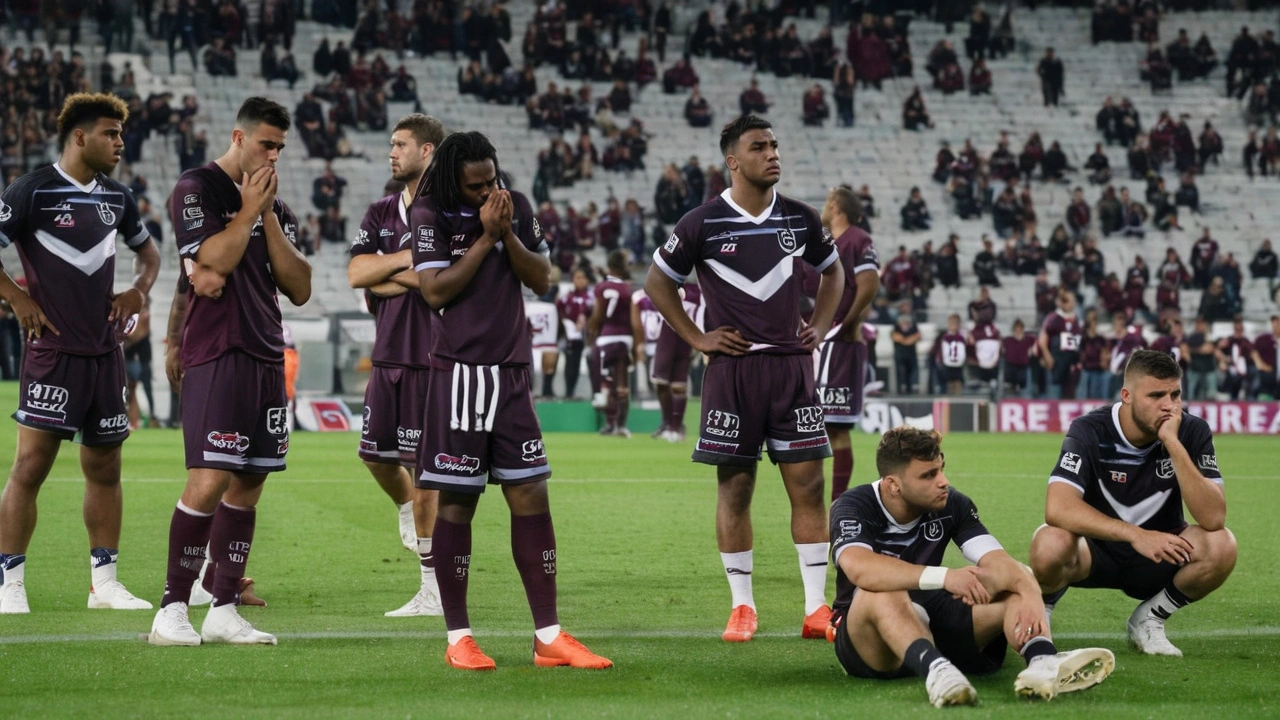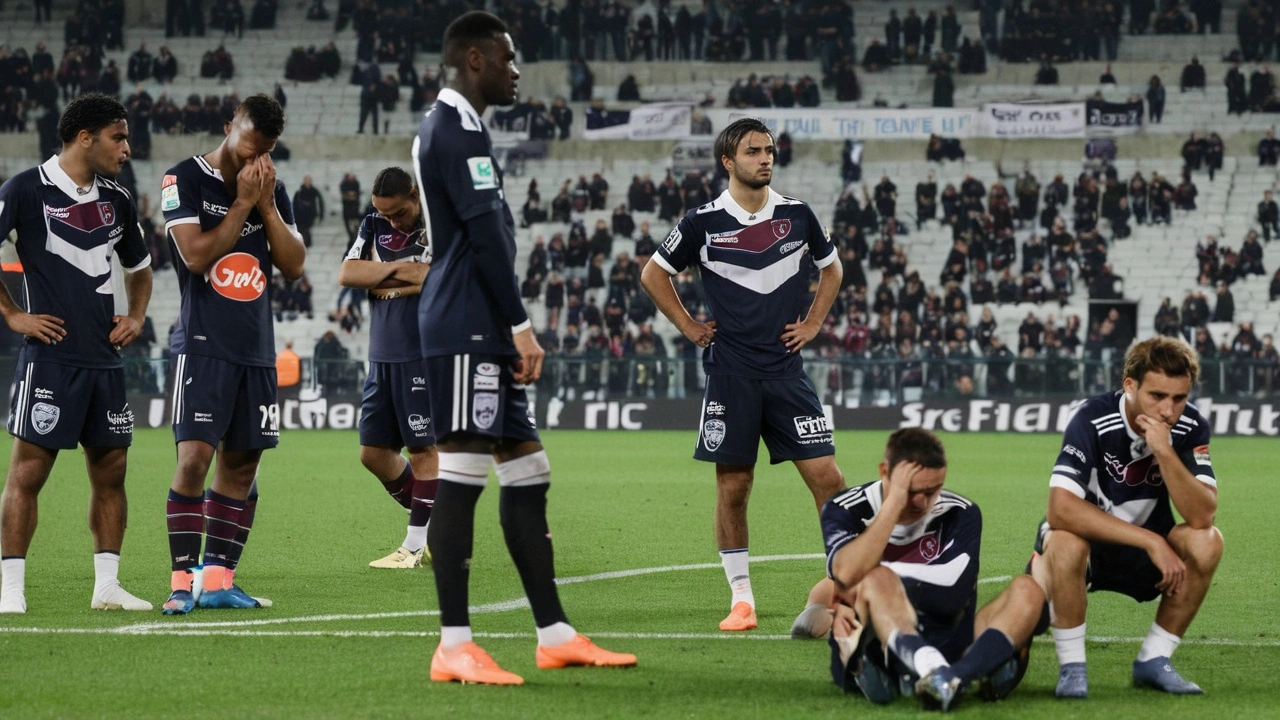Bordeaux's Illustrious Past
Once at the pinnacle of French football, Bordeaux were contenders for top honors in Ligue 1. Founded in 1881, the club's legacy is steeped in triumphs and significant moments. They have claimed the Ligue 1 title six times, with their most recent victory in 2009. Names like Zinedine Zidane, Bixente Lizarazu, and Jean-Claude Darcheville evoke memories of an era when the club was a breeding ground for talent and a fortress of footballing excellence. Legends were born on the pitch, and for decades, the team's success was synonymous with passion, dedication, and unparalleled skill.
Downfall and Relegation
However, the reality today stands in stark contrast. Bordeaux's relegation to Ligue 2 in 2022 marked the beginning of a cascading series of mishaps and misfortunes. Financial instability began to weigh heavily on the club, impacting their performance on the field and leading to administrative turmoil. Despite initial efforts to rally and reclaim their former glory, Bordeaux's struggles seemed insurmountable with each passing season. The specter of financial unrest loomed large, eventually culminating in their drop to the third tier of French football, the National 1 league.

Failed Takeover and Financial Struggles
A potential lifeline appeared in the form of Fenway Sports Group (FSG), the owners of Liverpool. Discussions between Bordeaux's owner, Lopez, and FSG hinted at a much-needed rescue plan that could potentially alleviate the chronic financial strains. Unfortunately, this promising takeover fell through, sealing Bordeaux's fate in their plight. Without the influx of capital and strategic vision that the takeover promised, the club's financial woes deepened. The French financial watchdog, DNCG, imposed sanctions, demanding that Bordeaux address a gaping 40 million euro deficit in their books.
Impact on Players and Fans
The decision to renounce professional status and terminate player contracts came as a heavy blow to both the team and the loyal fanbase. Players who had donned the Bordeaux jersey and invested their careers in the club were faced with uncertainty. Fans, who had cheered the team on through thick and thin, now grappled with the emotional toll of seeing their beloved club in distress. The decision marks not just a financial and administrative setback but also an emotional and cultural fracture within the community. The echoes of the stadium chants and the pride of wearing the club's colors are now punctuated by a somber reality.

The Role of New Investors
Efforts were made to secure new investors who could inject much-needed funds into the club, but none materialized with the necessary credentials and financial backing to turn the tide. The search for saviors seemed endless, but with each failed negotiation, hope dwindled. This relentless quest for stability became a battle against time and economics, one that Bordeaux ultimately could not win. The economic climate and competitive nature of modern football mean that such cases are increasingly common.
Consequences of Withdrawal from Professional Status
By withdrawing their appeal against relegation and surrendering their professional status, Bordeaux's administration made a hard, albeit pragmatic choice. This withdrawal signifies more than just accepting their place in National 1; it signifies a profound change in the club's identity and operational capacity. The focus will likely shift from high-stakes competition to rebuilding and rebranding, as the club navigates this new chapter in its extensive history. The economic, social, and cultural impacts of this decision will reverberate through the football community and beyond.
Conclusion: The Future of Bordeaux
The future of Bordeaux football club remains uncertain, but their rich history suggests a resilience that could see them rise again. The club, long a hallmark of French football, faces a period of reinvention and adaptation. It is a somber reminder of the fragility of success in professional sports and the intricate balance required to maintain it. Fans and players alike must now look towards this new era with a hopes that Bordeaux can eventually reclaim its place in the upper echelons of French football.

Steve Dunkerley
July 27, 2024 AT 00:04The financial mismanagement at Bordeaux is a textbook case of unsustainable wage structures.
Jasmine Hinds
August 5, 2024 AT 08:32What a roller‑coaster ride for the Girondins 😢. Their fall from Ligue 1 dominance shows how quickly fortunes can change in football.
Madison Neal
August 14, 2024 AT 17:01Indeed, the club's cash‑flow woes illustrate the perils of over‑leveraging player contracts and failing to diversify revenue streams.
John Crulz
August 24, 2024 AT 01:29Seeing Bordeaux drop to National 1 feels like watching a once‑great empire crumble under its own weight. The DNCG's audit exposed a massive €40 million gap, and no one could patch it up fast enough. Even the FSG talks fizzled, leaving the board with few options. Fans are left clutching memories while the squad faces contract terminations. It's a stark reminder that football is as much business as sport.
Anita Drake
September 2, 2024 AT 09:57From a cultural standpoint, this tragedy hits the local community hard; the club's identity is woven into the fabric of Bordeaux, and its decline reverberates beyond the pitch.
Eduardo Lopez
September 11, 2024 AT 18:25Honestly, Bordeaux's decision to abandon professional status is a disgrace to French football heritage. It smacks of reckless leadership and a lack of vision. The fans deserve better than watching their beloved institution become a footnote. This is not just a club issue; it's a national embarrassment.
Nancy Perez de Lezama
September 21, 2024 AT 02:54While the sentiment is understandable, it's worth noting that the financial realities left little room for redemption without external capital injection.
Matt Heitz
September 30, 2024 AT 11:22The downfall of Bordeaux underscores a broader problem: French clubs too often rely on foreign investors and neglect homegrown financial discipline. If we truly wanted to preserve our football heritage, we should prioritize domestic ownership and stricter fiscal oversight. The current model invites instability and erodes national pride.
Susan Mark
October 9, 2024 AT 19:50Good point-supporting local talent and ownership could indeed create a more sustainable ecosystem, though implementation remains challenging.
Jason Jennings
October 19, 2024 AT 04:18Honestly, this whole saga feels like a predictable outcome of mismanagement and inflated egos.
Diego Vargas
October 28, 2024 AT 11:46It's not just egos; the club's balance sheet showed chronic deficits for years, and they ignored red flags from auditors. Their failure to adapt to modern financial fair play standards sealed their fate.
Alex Lee
November 6, 2024 AT 20:15At the end of the day, Bordeaux blew it because they spent beyond their means.
Vida Yamini
November 16, 2024 AT 04:43While that summary hits the nail on the head, the situation is layered with multiple factors that deserve deeper analysis. The club's historic success created expectations that perhaps exceeded realistic budgetary limits. Additionally, the lack of a coherent long‑term strategy from the board left the team vulnerable to market fluctuations. Their reliance on one potential investor, rather than diversifying funding sources, amplified the impact when the FSG deal collapsed. Moreover, the broader economic climate in French football, with rising player wages and competition for sponsorship, placed further strain on already thin margins. All these elements combined to create a perfect storm that culminated in the drastic step of relinquishing professional status. It's a cautionary tale for other clubs navigating the delicate balance between ambition and fiscal responsibility.
James Lawyer
November 25, 2024 AT 13:11The recent decision by Girondins de Bordeaux to renounce their professional licence constitutes a critical inflection point in French football governance.
From a regulatory perspective, the DNCG's imposition of a €40 million deficit remediation order reflects systemic deficiencies in the club's accounting practices.
The failure to secure the proposed acquisition by Fenway Sports Group further exacerbated the liquidity crunch that had been mounting for several fiscal periods.
In accordance with Ligue 1 and Ligue 2 licensing criteria, clubs are obliged to demonstrate financial solvency, a benchmark Bordeaux repeatedly missed.
The resultant relegation to National 1 not only diminishes the club's competitive standing but also undermines its commercial revenue streams, including broadcasting rights and sponsorship accords.
Existing contractual obligations to players and staff become untenable under the new financial constraints, prompting premature terminations and heightened labor disputes.
Stakeholders, ranging from local government authorities to dedicated supporters' associations, face mounting pressure to devise remedial measures.
Historically, comparable cases in European football have shown that strategic restructuring, rather than outright dissolution, yields more sustainable outcomes.
Nonetheless, the paucity of viable domestic investors willing to inject capital at the required magnitude limits the feasible remedial pathways.
International investors, while potentially affluent, often demand strategic alignment that may conflict with the club's cultural heritage and community ties.
Consequently, the club's management must navigate a complex matrix of financial, legal, and sociocultural considerations.
The broader implication for French football is the heightened scrutiny of fiscal governance across all tiers, which may precipitate more rigorous financial fair play enforcement.
Fans, whose loyalty underpins the club's identity, experience an acute sense of disenfranchisement, potentially eroding long‑term support.
Yet, the resilience demonstrated by the supporter base in prior adversity suggests a latent capacity for collective action and grassroots financing initiatives.
In summary, while Bordeaux's descent underscores the perils of fiscal imprudence, it also provides a pragmatic case study for implementing more robust financial oversight mechanisms within the sport.
Abby Culbertson
December 4, 2024 AT 21:39Sounds legit, but honestly the fans will just keep cheering no matter what.
Awolumate Muhammed Abayomi
December 14, 2024 AT 06:08Let's stay hopeful! Even in tough times, the spirit of Bordeaux can rise again with the right support from the community.
Josh Tate
December 23, 2024 AT 14:36Community backing is essential, but we also need transparent management and realistic budgeting to avoid repeating past mistakes.
John Smith
January 1, 2025 AT 23:04Bottom line: Bordeaux blew their chances by ignoring basic financial principles.